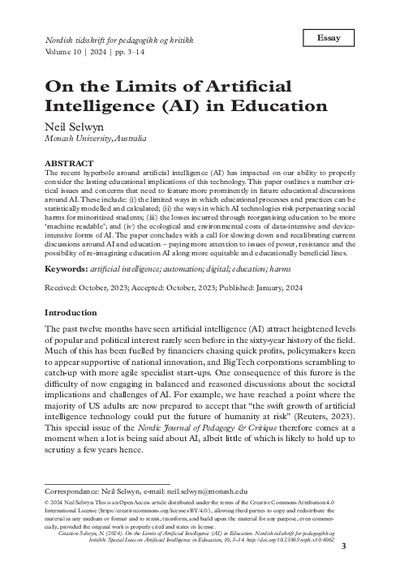On the Limits of Artificial Intelligence (AI) in EducationErstpublikation in: Nordisk tidsskrift for pedagogikk og kritikk Volume 10 | 2024 | pp. 3–14
Publikationsdatum:
|
 |
 Diese Seite wurde seit mehr als 7 Monaten inhaltlich nicht mehr aktualisiert.
Unter Umständen ist sie nicht mehr aktuell.
Diese Seite wurde seit mehr als 7 Monaten inhaltlich nicht mehr aktualisiert.
Unter Umständen ist sie nicht mehr aktuell.
 Zusammenfassungen
Zusammenfassungen
 This paper calls for more reasoned responses to the educational possibilities of AI.
While educators should not completely ignore recent developments around machine
learning, large-language models and the like, there is certainly a need to resist the
more extreme hopes and fears that the idea of AI technology continues to provoke. At
the same time, there is also a need to better engage with complex issues and concerns
that have so far tended to remain sidelined in educational discussions around AI.
This requires sustained, ongoing and open dialogue that brings in perspectives not
usually given space in conversations around digital innovation and education futures.
In particular, this requires paying closer attention to the experiences and standpoints
of those groups likely to gain least (and likely to lose most) from the unfettered
implementation of AI technology in education. As a start, this brief paper sets out
some pertinent starting-points from which such discussions can progress in earnest.
This paper calls for more reasoned responses to the educational possibilities of AI.
While educators should not completely ignore recent developments around machine
learning, large-language models and the like, there is certainly a need to resist the
more extreme hopes and fears that the idea of AI technology continues to provoke. At
the same time, there is also a need to better engage with complex issues and concerns
that have so far tended to remain sidelined in educational discussions around AI.
This requires sustained, ongoing and open dialogue that brings in perspectives not
usually given space in conversations around digital innovation and education futures.
In particular, this requires paying closer attention to the experiences and standpoints
of those groups likely to gain least (and likely to lose most) from the unfettered
implementation of AI technology in education. As a start, this brief paper sets out
some pertinent starting-points from which such discussions can progress in earnest.
The recent hyperbole around artificial intelligence (AI) has impacted on our ability to properly consider the lasting educational implications of this technology. This paper outlines a number critical issues and concerns that need to feature more prominently in future educational discussions around AI. These include:
- the limited ways in which educational processes and practices can be statistically modelled and calculated;
- the ways in which AI technologies risk perpetuating social harms for minoritized students;
- the losses incurred through reorganising education to be more ‘machine readable’; and
- the ecological and environmental costs of data-intensive and deviceintensive forms of AI.
The paper concludes with a call for slowing down and recalibrating current discussions around AI and education – paying more attention to issues of power, resistance and the possibility of re-imagining education AI along more equitable and educationally beneficial lines.
 Dieser wissenschaftliche Zeitschriftenartikel erwähnt ...
Dieser wissenschaftliche Zeitschriftenartikel erwähnt ...
 Dieser wissenschaftliche Zeitschriftenartikel erwähnt vermutlich nicht ...
Dieser wissenschaftliche Zeitschriftenartikel erwähnt vermutlich nicht ... 
 Nicht erwähnte Begriffe | Chat-GPT, Digitalisierung, Eliza, GMLS & Bildung, GMLS & Schule, Intelligenz |
 Tagcloud
Tagcloud
 Zitationsgraph
Zitationsgraph
 Zitationsgraph (Beta-Test mit vis.js)
Zitationsgraph (Beta-Test mit vis.js)
 Volltext dieses Dokuments
Volltext dieses Dokuments
 |  On the Limits of Artificial Intelligence (AI) in Education: Artikel als Volltext ( On the Limits of Artificial Intelligence (AI) in Education: Artikel als Volltext ( : :  , 107 kByte; , 107 kByte;  : :  ) ) |
 |  On the Limits of Artificial Intelligence (AI) in Education: Artikel als Volltext ( On the Limits of Artificial Intelligence (AI) in Education: Artikel als Volltext ( : :  , 107 kByte; , 107 kByte;  : :  ) ) |
 Anderswo suchen
Anderswo suchen 
 Beat und dieser wissenschaftliche Zeitschriftenartikel
Beat und dieser wissenschaftliche Zeitschriftenartikel
Beat hat Dieser wissenschaftliche Zeitschriftenartikel während seiner Zeit am Institut für Medien und Schule (IMS) ins Biblionetz aufgenommen. Er hat Dieser wissenschaftliche Zeitschriftenartikel einmalig erfasst und bisher nicht mehr bearbeitet. Beat besitzt kein physisches, aber ein digitales Exemplar. Eine digitale Version ist auf dem Internet verfügbar (s.o.). Es gibt bisher nur wenige Objekte im Biblionetz, die dieses Werk zitieren.









 Chatbot
Chatbot Daten
Daten Generative Machine-Learning-Systeme (GMLS)
Generative Machine-Learning-Systeme (GMLS) Gesichtserkennung
Gesichtserkennung Künstliche Intelligenz (KI / AI)
Künstliche Intelligenz (KI / AI) machine learning
machine learning Statistik
Statistik Textgeneratoren-Verbot
Textgeneratoren-Verbot



 Biblionetz-History
Biblionetz-History